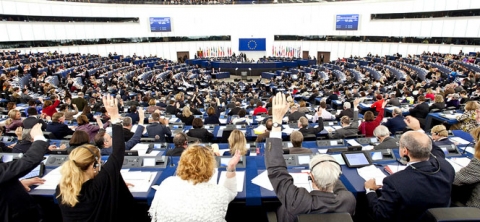Transatlantic trade talks hit German snag

FT | March 14, 2014
Transatlantic trade talks hit German snag
By Shawn Donnan in Brussels and Stefan Wagstyl in Berlin
Germany has introduced a stumbling block to landmark EU-US trade negotiations by insisting that any pact must exclude a contentious dispute settlement provision.
The "investor-state dispute settlement" mechanism, or ISDS, would allow private investors to sue governments if they felt local laws threatened their investments. Public opposition to its inclusion has grown in both Europe and the US since the launch last year of negotiations over a transatlantic trade area.
Earlier this year, the European Commission suspended negotiations over the ISDS clause to allow for a 90-day public consultation exercise, expected to be launched within days.
That move was intended to help defuse some of the opposition and explain why an arbitration mechanism was needed. But opposition to ISDS has only grown since then.
Now, in the biggest blow yet to those seeking its inclusion in the deal, Berlin has decided that it will push for the exclusion of the ISDS provisions in the deal.
A spokesman for the economy ministry in Berlin said on Friday that the government had relayed its position to officials in Brussels, where negotiators have ended a week of talks over the proposed Transatlantic Trade and Investment Partnership (TTIP).
Earlier in the week, Brigitte Zypries, a junior economy minister, told the German parliament that Berlin was determined to exclude arbitration rights from the TTIP deal.
"From the perspective of the [German] federal government, US investors in the EU have sufficient legal protection in the national courts," she told parliament.
The German position pits Berlin against the commission, the US and business groups. All of them argue that the transatlantic deal is an opportunity to update arbitration rights that already feature in existing bilateral investment treaties and are often open to abuse.
Such ISDS provisions have been a feature of investment treaties since the late 1950s, when the first was included in a bilateral agreement between Germany and Pakistan. But their use by companies as an avenue to seek compensation for government decisions has grown in recent years.
In some cases, they have been used to combat perceived gross injustices against specific investors. Repsol, the Spanish oil company, was able to seek compensation from Argentina under an investment treaty after its local operations were seized by the government in Buenos Aires.
They have also been used to challenge broader government policy or regulatory decisions, however. Vattenfall, the Swedish energy company, is currently seeking compensation from Germany for Berlin’s decision to phase out nuclear power following the Fukushima disaster in Japan. In another well-publicised case, Philip Morris
International is seeking compensation from Australia for lost income because of the
introduction there of plain-packaging laws for tobacco products.
The German position may still be open to some negotiation - particularly if both the EU and the US agree to allow arbitration only in extreme cases.
Berlin’s final stand may also depend on the European consultation process.
But Berlin’s move is a sign of the complicated political context the transatlantic deal faces in Europe.
Nicole Bricq, France’s trade minister, has raised concerns before over the ISDS provision. Germany has until now backed its inclusion in the new pact. But Berlin has also been confronted with growing public scepticism in recent months over the transatlantic deal as a whole, and the ISDS provision in particular.
At a press conference to mark the close of the fourth round of negotiations on Friday, Dan Mullaney, the leading US negotiator, declined to comment on the German decision.
Ignacio Garcia Bercero, the EU’s chief negotiator, also refused to comment on it. But he pointed out that the EU’s original mandate to negotiate specifically included an ISDS provision and had been approved by member states, including Germany.
"We are working on the basis of the mandate that has been given to us," said Mr Garcia Bercero.
The provision is opposed by consumer groups and environmentalists on both sides of the Atlantic. They argue that the very threat of litigation could challenge everything from food safety standards to a ban on fracking now in place in France. They also argue that the court systems in both the US and EU are mature enough not to be a concern to foreign investors.
Business groups argue, however, that including proper safeguards for investors in a new pact is crucial to help encourage the flow of investment across the Atlantic.
"If you want to attract investors, you need to have all of the positive signals on your side," said Hendrik Bourgeois, vice-president of European affairs for GE, the US industrial group, and chairman of the American Chamber of Commerce to the EU.
Business groups and trade negotiators on both sides also argue that including the provision is vital as a precedent for other deals. Both the EU and the US have launched investment discussions with China, and the EU is expected to begin talks on an investment treaty with Myanmar next week.
Including investor protection provisions in those deals would be more difficult if they were excluded from the EU-US agreement, negotiators and lobbyists say.
The US conducted public consultations on the subject in 2009, leading to the agreement with Congress of a model investment treaty that includes robust investor-protection provisions.
The European Commission hopes its consultations will do the same. But some now fear that the EU’s consultations may feed the opposition.
"It is important to us that this [EU] public consultation is not a referendum on ISDS. It is important that [ISDS] is included in the agreement," said Luisa Santos, director of the international relations department of the BusinessEurope lobby group. "Excluding it is not the answer."





